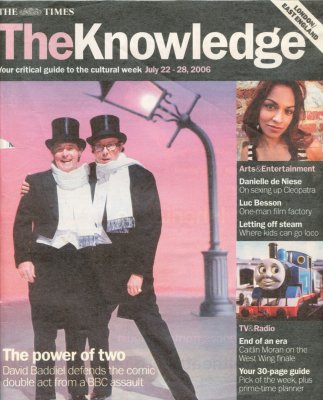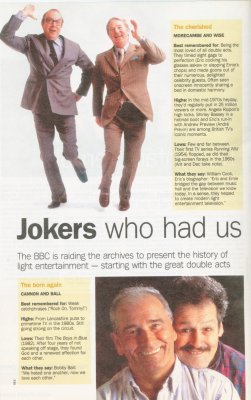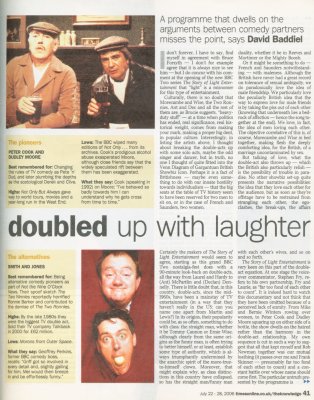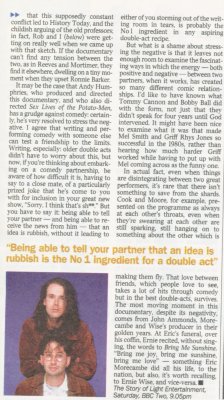
Article in the Times’ ‘The Knowledge’ Magazine, 22nd July 2006
Jokers who had us doubled up with laughter



The Cherished: MORECAMBE AND WISE
Best remembered for: Being the most loved of all double acts. They timed sight gags to perfection (Eric cocking his glasses askew or slapping Ernie’s chops) and made goons out of their numerous, delighted celebrity guests. Often seen onscreen innocently sharing a bed in domestic harmony. Highs: In the mid-1970s heyday, they’d regularly pull in 25 million viewers or more. Angela Rippon’s high kicks, Shirley Bassey in a hobnail boot and Eric’s run-in with Andrew Preview (Andre Previn) are among British TVs iconic moments.
Lows: Few and far between. Their first TV series Running Wild (1954) flopped, as did their big-screen forays in the 1960s (Ant and Dec take note).
What they say: William Cook, Eric’s biographer: “Eric and Ernie bridged the gap between music hall and the television we know today. In a sense, they helped to create modern light entertainment television.”
The Born Again: CANNON AND BALL
Best remembered for: Weak catchphrases (“Rock On, Tommy!”)
Highs: From Lancashire pubs to primetime TV in the 1980s. Still going strong on the circuit.
Lows: Their film The Boys in Blue (1982). After four years of not speaking off stage, they found God and a renewed affection for each other.
What they say: Bobby Ball: “We hated one another, now we love each other.”
The Pioneers: PETER COOK AND DUDLEY MOORE
Best remembered for: Changing the rules of TV comedy as Pete ‘n’ Dud, and later plumbing the depths as the scatological Derek and Clive.
Highs: Not Only But Always gave way to world tours, movies and a year-long run in the West End.
Lows: The BBC wiped many editions of Not Only… from its archives. Cook’s prodigious alcohol abuse exasperated Moore, although close friends say that the widely speculated rift between them has been exaggerated.
What they say: Cook (speaking in 1992) on Moore: “I’ve behaved so badly towards him I can understand why he gets cross from time to time.”
The Alternatives: SMITH AND JONES
Best remembered for: Being alternative comedy pioneers as part of Not the Nine O’Clock News. Their spoof sketch The Two Ninnies reportedly horrified Ronnie Barker and contributed to the demise of The Two Ronnies.
Highs: By the late 1980s they were the biggest TV double act. Sold their TV company Talkback in 2000 for £62 million.
Lows: Morons from Outer Space.
What they say: Geoffrey Perkins, former BBC comedy boss, recalls: “Griff got so involved in every detail and, slightly galling for him, Mel would then breeze in and be effortlessly funny.”
The BBC is raiding the archives to present the history of light entertainment – starting with the great double acts A programme that dwells on the arguments between comedy partners misses the point, says David Baddiel
I don’t forever, I have to say, find myself in agreement with Bruce Forsyth – I don’t for example agree that it is always nice to see him – but I do concur with his comment at the opening of the new BBC Two series The Story of Light Enter-tainment that “light” is a misnomer for this type of entertainment
Culturally, there is no doubt that Morecambe and Wise, the Two Ronnies, Ant and Dec and all the rest of them are, as Brucie suggests, “heavy-duty stuff” – at a time when politics has ended, real significance, real historical weight, comes from making your mark, making a proper big dent, in popular culture. Interestingly, in listing the artists above, I thought about breaking the double-acts up with some solo acts, maybe the odd singer and dancer, but in truth, no one I thought of quite fitted into the Venn Diagram of Gargantuan British Showbii Icon. Perhaps it is a fact of Britishness – maybe even something to do with our innate hostility towards individualism – that the big seats at the table of TV history seem to have been reserved for two men to sit on, or in the case of French and Saunders, two women. Certainly the makers of The Story of Light Entertainment would seem to agree, starting as this grand BBC Two nostalgia-fest does with a 90-minute look-back on double-acts, all the way from Laurel and Hardy to (Ant) McPartlin and (Declan) Donnelly. There is little doubt that, in this country, double-acts, since the mid-1960s, have been a mainstay of TV entertainment (in a way that they haven’t really in the US: can you name one apart from Martin and Lewis?) In its origins, their popularity could be, as so often, something to do with class: the straight man, whether it be Tommy Cannon or Ernie Wise, although dearly from the same origins as the funny man, is often trying to better himself, or at least, establish some type of authority, which is always triumphantly undermined by the anarchic spirit of the more-true-to-himself clown. Moreover, that might explain why, as class distinctions in this country have collapsed, so has the straight man/funny man duality, whether it be in Reeves and Mortimer or the Mighty Boosh.
Or it might be something to do – French and Saunders notwithstanding – with maleness. Although the British have never had a great record on tolerance of sexual ambiguity, we do paradoxically love the idea of male friendship. We particularly love the peculiarly British idea that the way to express love for male friends is by taking the piss out of each other (knowing that underneath lies a bedrock of affection – hence the song together at the end). We love, in fact, the idea of men loving each other. The objective correlative of this is, of course, Morecambe and Wise in bed together, making flesh the deeply comforting idea, for the British, of a marriage uncontaminated by sex.
But talking of love, what the double-act also throws up – which the British also particularly relish – is the possibility of trouble in paradise No other showbiz set-up quite presents the narrative possibilities: the idea that they love each other for the audience, but as soon as they’re offstage have to be restrained from strangling each other, the ego-clashes, the break-ups, the affairs with each other’s wives, and so on and so forth.
The Story of Light Entertainment is very keen on this part of the double-act equation. At one stage the voice-over commentator, Stephen Fry, refers to his own partnership, Fry and Laurie, as “far too fond of each other to count”. It is indeed hard to watch this documentary and not think that they have been omitted because of a perceived lack of enmity. From Mike and Bemie Winters rowing over women, to Peter Cook and Dudley Moore squaring up on either side of a bottle, the show dwells on the hatred rather than the harmony in the double-act relationship. My own sequence is cut in such a way to suggest that all that kept myself and Rob Newman together was our mutual loathing (it passes over me and Frank Skinner – presumably far too fond of each other to count) and a constant battle over whose name should come first The particular untruth presented by the programme is that this supposedly constant conflict led to History Today, and the childish arguing of the old professors; in fact Rob and I (below) were getting on really well when we came up with that sketch. If the documentary can’t find any tension between the two, as in Reeves and Mortimer, they find it elsewhere, dwelling on a tiny moment when they upset Ronnie Barker. It may be the case that Andy Humphries, who produced and directed this documentary, and who also directed Sex Lives of the Potato-Men, has a grudge against comedy: certainly, he’s very resolved to stress the negative. I agree that writing and performing comedy with someone else can test a friendship to the limits. Writing, especially: older double acts didn’t have to worry about this, but now, if you’re thinking about embarking on a comedy partnership, be aware of how difficult it is, having to say to a dose mate, of a particularly prized joke that he’s come to you with for inclusion in your great new show, “Sorry, I think that’s sh**.” But you have to say it being able to tell your partner – and being able to receive the news from him – that an idea is rubbish, without it leading to either of you storming out of the writing room in tears, is probably the No 1 ingredient in any aspiring double-act recipe.
But what is a shame about stressing the negative is that it leaves not enough room to examine the fascinat-ing ways in which the energy – both positive and negative – between two partners, when it works, has created so many different comic relationships. I’d like to have known what Tommy Cannon and Bobby Ball did with the form, not just that they didn’t speak for four years until God intervened. It might have been nice to examine what it was that made Mel Smith and Griff Rhys Jones so successful in the 1980s, rather than hearing how much harder Griff worked while having to put up with Mel coming across as the funny one.
In actual fact, even when things are disintegrating between two great performers, it’s rare that there isn’t something to save from the shards. Cook and Moore, for example, presented on the programme as always at each other’s throats, even when they’re swearing at each other are still sparking, still hanging on to something about the other which is making them fly. That love between friends, which people love to see, takes a lot of hits through comedy but in the best double-acts, survives. The most moving moment in this documentary, despite its negativity, comes from John Ammonds, More-cambe and Wise’s producer in their golden years. At Eric’s funeral, over his coffin, Ernie recited, without singing, the words to Bring Me Sunshine. “Bring me joy, bring me sunshine, bring me love” – something Eric Morecambe did all his life, to the nation, but also, it’s worth recalling, to Ernie Wise, and vice-versa. ? The Story of Light Entertainment, Saturday, BBC Two, 9.05pm.